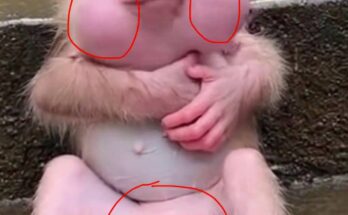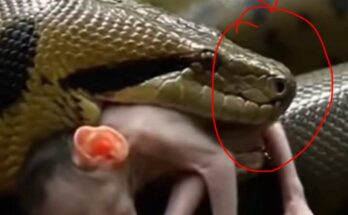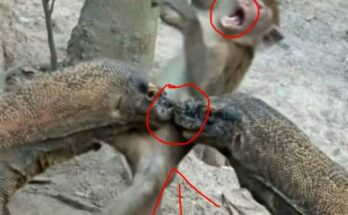
In the heart of the jungle, where vines curled like ribbons and birds sang sweet songs, something unusual caught the attention of the monkey troop one sunny afternoon.
It started with a sound—squeaky giggles and rustling leaves—coming from a clearing near a shallow jungle stream. Several older monkeys swung closer to investigate, their curious eyes searching for the source of the sound. And there, in the middle of it all, was a sight none of them expected.
A baby monkey, no more than a few months old, was rolling joyfully in a thick patch of fresh, wet mud. His tiny body, from head to tail, was completely covered in brown, sticky muck. His face peeked out just enough to show his bright eyes and playful smile. And he wasn’t alone.
Two more baby monkeys soon joined the muddy fun, plopping onto the soft ground, flailing their arms, and laughing in high-pitched squeals. The mud squelched under their tiny hands and feet as they kicked and splashed like toddlers in a puddle. It was strange. It was messy. And it was completely hilarious.
Several older monkeys gasped in surprise, while others covered their mouths to hide their laughter. “What in the world are they doing?” one elder monkey asked, scratching his head in disbelief. “Have they gone bananas?”
The mother of the first baby monkey, named Luma, arrived moments later. Her eyes widened when she saw her child—once clean and fluffy—now transformed into a brown, dripping mess. “Oh my goodness!” she exclaimed, swinging down in a flash. “What happened to you?”
But the baby only giggled and reached up to her with muddy arms. Hesitant at first, Luma stepped closer and sniffed. The mud smelled fresh—just soil and water—and the baby wasn’t hurt. In fact, he looked happier than ever. She sighed, shaking her head.
Soon, other mothers arrived too, calling out their babies’ names, fussing over their messy fur and slippery fingers. But when they saw the pure joy on their children’s faces, something changed.
“Maybe… they’re just exploring,” one mother said softly.
“Or cooling off,” another added, wiping a smear of mud from her child’s ear.
It turned out that the mud pit had formed after a night of heavy rain. The babies, curious and adventurous, had discovered it while playing near the stream. What began as an accident—one baby slipping and falling—had quickly turned into a game. The cool mud soothed their warm bodies, and the slippery texture made everything funnier.
Though it looked strange to the adults, it was a form of play—natural, safe, and joyful.
Eventually, the troop relaxed. Some adults even joined in, dabbing mud on each other’s noses or sliding down the muddy slope for fun. The forest echoed with laughter, and for that afternoon, the troop forgot their usual worries.
When the playtime ended, the mothers guided their babies to the stream. One by one, they were washed clean, their soft fur returning to its usual color. The water shimmered in the afternoon light as the babies splashed happily during their rinse.
Later, as the sun began to set, the babies lay curled against their mothers, tired from their muddy adventure. Luma held her child close, still smiling.
“You really surprised me today,” she whispered, brushing a bit of dried mud from his cheek. “But maybe that’s what babies are supposed to do—remind us how to be free.”
From that day on, the muddy spot became a favorite play area for the troop’s youngest members. And whenever a baby returned covered in dirt, no one gasped anymore. Instead, they smiled knowingly and said, “Ah, another muddy mystery.”
Because in the jungle, not all strange things are bad. Sometimes, they’re just signs that joy has been found in the most unexpected places


